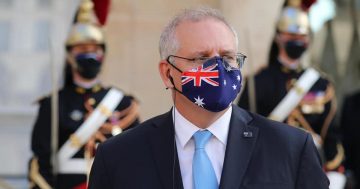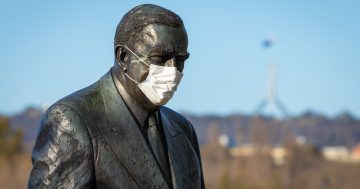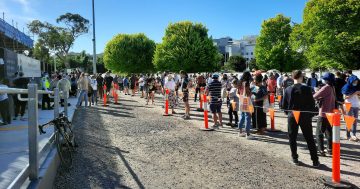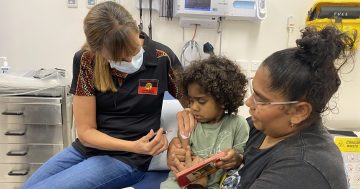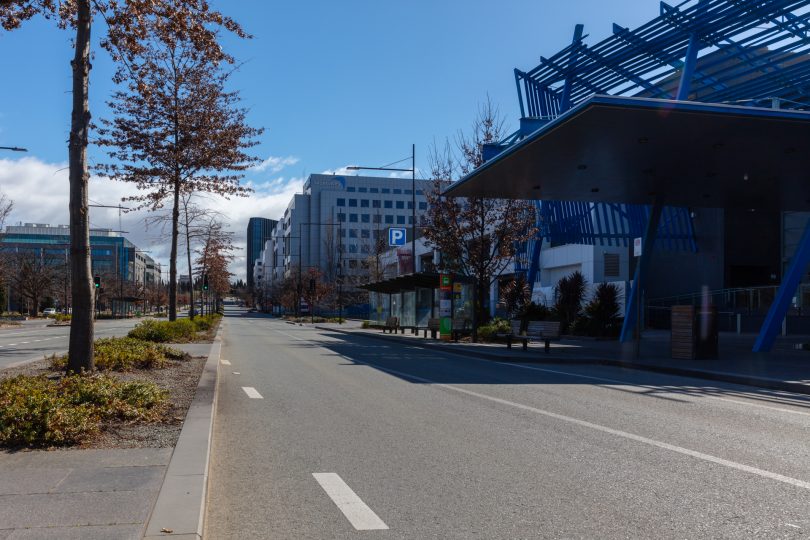
Canberra’s playing by the rules, but the mental toll of lockdown is starting to mount. Photo: Thomas Lucraft.
In the past week and a half, Canberrans have had just a small taste of the hard lockdowns experienced in other states and territories, and the effects are already being seen when it comes to our mental health.
As the novelty has worn off and the reality sets in, many of us are starting to feel fatigued, frustrated and stressed about how long this could go on – and that’s just those of us who are lucky enough not to have to worry about keeping our jobs or living with compromised immunity.
When faced with a situation like this, where circumstances outside our control limit our individual choices and actions, and when we feel increasingly helpless in the face of infection rates and a virus that seems to out-trick us every time, it’s easy to look for someone to blame.
Whether it’s blaming the government for rolling out lockdown measures too quickly, or too slowly; or lashing out at family and friends who are hesitating to get vaccinated, or taking to social media to rant against people not following lockdown measures the way they should – there’s lots of scope to channel our rage.
But despite there being plenty of valid reasons to criticise each other and our leaders, if there’s one thing I’ve learned from this brief foray into lockdown land, it’s that blaming people is meaningless in the face of a pandemic that actually doesn’t discriminate.
COVID doesn’t play by human rules – it’s a virus that can and has gotten to people across the complete spectrum of cultures, ages, backgrounds, political persuasions and beliefs. At this point in the pandemic, trying to pin the blame for how the virus is spreading is splitting hairs because it’s inevitable that it will spread, and all we can do is try to limit the spread and prevent infections through vaccinations.
Unfortunately, as our reactions to COVID become more polarised and the vaccination issue becomes politicised, we risk moving ever further from that goal.
I’m not above the blame game myself.
I have a relative who was very opposed to getting the AstraZeneca vaccine and was not totally sold on Pfizer either. He wasn’t eligible for the latter, and despite living with immuno-compromised family members, he was really digging his heels about getting the jab. I felt nothing but frustration – I thought it was immature, ignorant, and frankly dangerous for him to ignore the best health advice and continue to remain unvaccinated because my own viewpoint was that the risk was balanced against the reward of moving out of lockdown sooner.
But of course, it isn’t as simple as right and wrong.
A week ago, after a death in the family (not COVID-related), this relative booked himself in for his first jab – grief had made him realise that he wanted to do everything he could to live life as fully as possible. Despite his concerns, he was willing to get vaccinated if it was going to help him get out of lockdown sooner and protect his family. It was a journey he had to go through in his own time and a decision that he needed to make himself, not by being pressured by us.
Because the conversation publicly had gotten so polarised, he felt awkward about telling his family about his decision, as though he would be mocked for it or have to suffer an ‘I told you so’ or two. Instead, we just told him we were glad he did it and left it at that.
The last thing we need right now is to make COVID the grounds for more culture wars and blame games. People have all manner of reasons for how they’re approaching the pandemic, and like most major issues, the nuances and complexities are lost in the public debate.
When we rush to identify individuals who have brought the virus into Canberra and to pinpoint what they did wrong; or when we rail against those who haven’t yet been vaccinated or criticise the politicians trying to respond to the pandemic, we’re making it harder to retain a sense of community at a time when we are more isolated than ever before.
Yes, there is a distinction between right and wrong in the pandemic, and there are people who are flouting lockdown laws and knowingly endangering others. But there are way more people genuinely trying to do the right thing, interpreting information as they get it, and attempting to live their lives while coping with a lot of stress, anxiety and fear. They’ll get it wrong sometimes. We’re only human, and that’s inevitable. But we can only get it right if we work together.
Let’s focus on the bigger picture and try and get through this as a community – no amount of blame and conflict will change the fact that COVID is here and we have to respond together to get back to enjoying our city fully.














